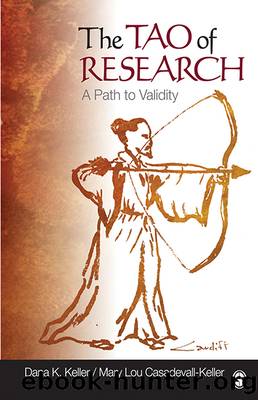The Tao of Research by Dana K. Keller Mary Lou Casadevall-Keller

Author:Dana K. Keller, Mary Lou Casadevall-Keller [Dana K. Keller, Mary Lou Casadevall-Keller]
Language: eng
Format: epub
Tags: Social Science, Research, Reference
ISBN: 9781452223292
Google: RwJ1AwAAQBAJ
Publisher: SAGE Publications
Published: 2009-04-29T03:35:59+00:00
4a. Access
Who is allowed data?
Who is restricted?
Debate continues
Researchers conflicted
Most data set owners exercise some degree of care in the release of their data because of issues regarding sensitivity and plausible release of information within a data set. Fundamentally, the more sensitive the data are, the more checks there will be on the security of the data and on the legitimacy of the researchers. For truly protected information, fines and jail sentences could await cavalier researchers. There is a spectrum that runs from data housed within a public domain site to data surrounded by extraordinary security measures with only a handful of researchers having access, so there is room for all levels and types of researchers to gain some access to othersâ data. Yet even researchers with stellar reputations that could span decades are often denied access to PHI and other sensitive data.
Data access does not refer only to data set access. The concept also refers to people, places, and things. For example, eyewitnesses of unimpeachable reputations are quite valuable to a very wide range of topics. The communication might be to gain background or other contextual information, or any manner of other related issue. Yet such people could now be deceased, imprisoned, too old and infirm, on the other side of the world, or state or national leaders with too busy a schedule to meet with a researcher on a particular topic. Even corporate leaders are difficult to reach for personal communication. Additionally, language issues can greatly hamper communication. Although translators are often helpful, important nuances can be lost.
Places can also function as access restrictions, and they can do so in several ways. Places can be remote, environmentally hostile, physically dangerous, or politically closed to foreigners, or they can require extreme prior conditioning just to survive. If a project included researching microbial life forms a mile below the ice in Antarctica, for example, the researchers would face an inordinately large number of physical and logistical obstacles.
Finally, things can be functional restrictions to research by being too something, such as too big, too small, too costly, too toxic, too rare, too dangerous, too resource intensive, and so on. People have limitations in how they can interact with the world and in the extent to which they can manipulate various tools to increase the range of that interaction (e.g., a microscope allows us to see objects too small to see otherwise). These tools that allow us to overcome these functional restrictions can also bring restrictions of their own (e.g., destructive testing).
Both the high school principal and the director of public health have full clearance for any and all data or other information collected by their respective environments. Yet both of them will have a different type of access issueâobtaining secure access for the statisticians and others who might be needed for some of the more technical aspects of the work.
The professor was denied access to the populations she most wanted to interview because she was unable to secure funding for her planned fieldwork in west Africa.
Download
This site does not store any files on its server. We only index and link to content provided by other sites. Please contact the content providers to delete copyright contents if any and email us, we'll remove relevant links or contents immediately.
| Electron Microscopes & Microscopy | Experiments & Projects |
| Measurement | Microscopes & Microsocopy |
| Scientific Instruments | Telescopes |
| Time | Methodology & Statistics |
Hands-On Genetic Algorithms with Python by Eyal Wirsansky (2020) by Unknown(4107)
Thing Explainer by Randall Munroe(3932)
The Elements by Theodore Gray(3052)
The Meaning of it All by Richard Feynman(2354)
Make by Mike Westerfield(2317)
Every Tool's a Hammer by Adam Savage(1942)
Science Experiments You Can Eat by Vicki Cobb(1877)
The Perfectionists by Sara Shepard(1823)
Martin Gardner's Science Magic by Martin Gardner(1730)
Raspberry Pi Electronics Projects for the Evil Genius (Tab) by Norris Donald & Norris Donald(1707)
Elephants on Acid by Boese Alex(1603)
Elephants on Acid: And Other Bizarre Experiments by Alex Boese(1588)
The Perfectionists by Simon Winchester(1582)
Handbook of Modern Sensors by Jacob Fraden(1578)
Synchrotron Light Sources and Free-Electron Lasers by Eberhard J. Jaeschke Shaukat Khan Jochen R. Schneider & Jerome B. Hastings(1559)
Tesla by Carlson W. Bernard(1523)
The Science of Food by Marty Jopson(1479)
The Meaning Of It All by Richard P. Feynman(1460)
125 Physics Projects for the Evil Genius by Silver Jerry(1454)
